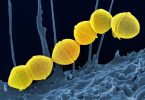Reputable research workers are working around the clock to give direction on how to best care for yourself if you suspect you are sick with COVID-19 coronavirus.
Medical studies on COVID-19 are being released at a breakneck pace, often generating confusion over simple matters such as which pain relievers to take, or how to care for sick family members at home.
For guidance, National Geographic turned to leading physicians and researchers across the U.S. and Canada for their recommendations on in-home care, as well as when to seek medical attention.
Six leading physicians explain what we know so far about treating COVID-19 in the emergency room and at home.
HOW TO COMBAT A FEVER
The good news is that approximately 80 percent of all COVID-19 cases exhibit only mild to moderate symptoms that don’t require hospitalization. Doctors recommend that these patients self-isolate, stay hydrated, eat well, and manage their symptoms as best they can.
For taking care of the fever associated with many illnesses, including COVID-19, physicians suggest taking acetaminophen—known internationally as paracetamol—before ibuprofen. If the fever persists, patients should then consider switching to ibuprofen, says Julie Autmizguine, a pediatric infectious disease specialist at CHU Sainte-Justine in Montreal, Canada.
She and other doctors express this preference because ibuprofen and related drugs—called NSAIDs for short—can have harmful side effects for those sick with COVID-19 coronavirus, including kidney injury, stomach ulcers, and gastrointestinal bleeding.
However, this warning does not mean that ibuprofen and NSAIDs worsen outcomes with the coronavirus, as viral news stories suggested last week after the French Ministry of Health said the drugs should be avoided during COVID-19 therapy.
“I don’t know that NSAIDs have been shown to be a bad problem for this disease or for any coronavirus,” says coronavirus expert Stanley Perlman, a pediatrician and immunologist at the University of Iowa’s Carver College of Medicine.
Acetaminophen also comes with hazards, and people should take it only if they are not allergic or do not have existing liver damage. The medication is safe at total daily doses of less than 3,000 milligrams, but exceeding this daily maximum can risk liver injury or worse.
“Acetaminophen overdose is the most common cause of acute liver failure in the United States,” says José Manautou, a toxicologist at the University of Connecticut School of Pharmacy.
People should make sure to account for all the medicines they are consuming, since over-the-counter medicines that target flu symptoms and some sleep aids often contain acetaminophen. People should also avoid drinking alcohol when taking acetaminophen. The liver relies on the same substance—glutathione—to temper the toxic potential of of both alcohol and acetaminophen. If you consume too much of both, it can cause toxins to accumulate in the body. (Once your body’s infected, this is what coronavirus does.)
WHAT ABOUT CHLOROQUINE AND AZITHROMYCIN?
Medical teams are working nonstop to learn how to best treat COVID-19, and over the last week, U.S. President Donald Trump has joined the fray by voicing his support for two drugs that have existed for decades—the antibiotic azithromycin, and a version of the antimalarial drug chloroquine.
In truth, the U.S. Food and Drug Administration has not approved hydroxychloroquine—most often used to treat rheumatoid arthritis and lupus—for use with COVID-19, though it has approved a test in combination with azithromycin that is now slated for New York. Meanwhile, health officials around the world, including Anthony Fauci, the head of the U.S. National Institute of Allergy and Infectious Diseases, are urging caution about the drugs.
“Many of the things that you hear out there are what I had called anecdotal reports,” Fauci said in a press briefing on Saturday for the White House coronavirus task force. “My job is to ultimately prove without a doubt that a drug is not only safe, but that it actually works.”
The chloroquine narrative started with several small studies from China and France—both of which have shortcomings and offer few lessons for patients at large. The French results are based on only 36 people and focus on the patients’ viral load, or the amount of virus in the body. Indeed, the only patients to die or to be sent to intensive care in the French study had taken hydroxychloroquine.
“We don’t have data from randomized, controlled trials telling us how chloroquine worked in real people,” says Annie Luetkemeyer, an HIV and infectious diseases specialist at the University of California, San Francisco, Department of Medicine.
Self-medication with hydroxychloroquine and azithromycin for those sick with COVID-19 coronavirus may also come with hazards, as the two drugs might stress the heart and increase the risk of arrhythmia. On Monday, the president vowed to send New York thousands of doses of the combo for an FDA trial, not long after an Arizona hospital reported one of its patients died after self-medicating on chloroquine phosphate, a form of the compound used to clean aquarium tanks. Nigerian health officials reported two cases of chloroquine overdoses over the weekend.
“The last thing that we want right now is to inundate our emergency departments with patients who believe they found a vague and risky solution that could potentially jeopardize their health,” Daniel Brooks, the medical director of the Banner Poison and Drug Information Center in Phoenix, says in a statement.
ARE BLOOD PRESSURE MEDICATIONS SAFE?
ACE inhibitors, drugs that are used widely to treat high blood pressure, have also come under fire during the COVID-19 crisis, with some reports suggesting that patients should stop taking these medications if they develop symptoms.
In a series of letters in the British Medical Journal, Nature Reviews Cardiology, and The Lancet Respiratory Medicine, researchers raised questions over whether ACE inhibitors might help establish coronavirus infections in people’s lungs. The concern stems from the fact that SARS and the new coronavirus enter cells by latching on to a protein called angiotensin-converting enzyme 2, or ACE2 for short. The protein abounds on the surfaces of cells in the heart and lungs, where it helps regulate a hormone that affects blood pressure constriction.
One consequence of ACE inhibitors is that they may prompt cells to make more ACE2. A 2005 study found evidence of such an increase in mice, and a 2015 study in humans found increased ACE2 levels in the urine of patients who were taking a medication related to ACE inhibitors.
But there is no current evidence that ACE inhibitors worsen COVID-19 outcomes in humans, according to the American Heart Association, the European Society of Cardiology’s Council on Hypertension, and a March 20 review published in the European Heart Journal. Doctors’ overriding advice is that if you’ve been prescribed a medication, continue taking it until told otherwise by your medical provider.
“We should neither be starting nor stopping these medications until we have much more information,” Luetkemeyer says.
People with high blood pressure and heart disease do appear to be at higher risk for COVID-19, but that probably has more to do with the underlying ailments themselves. What’s more, ACE inhibitors may have anti-inflammatory properties, which may help the lungs of COVID-19 patients better cope with the infection. (Learn how these underlying conditions make coronavirus more severe.)
“That would be a key study, to compare people with high blood pressure plus or minus these drugs, to see if there’s any difference,” Perlman says. “But it’d be very hard to do, and probably very hard to ethically justify.”
WHEN TO SEEK MEDICAL ATTENTION
“By all means, if you’re having emergency breathing symptoms or something’s troublesome, we do want you to seek emergency attention,” says Purvi Parikh, an allergy and infectious disease specialist at NYU Langone in New York City. If you choose to seek help at a local hospital, here’s one example of what you might expect.
At the Inova Health System’s flagship hospital in Fairfax, Virginia, staff have set up an outdoor tent to separate people reporting respiratory ailments from those with other illnesses. The two groups are processed in different parts of the waiting room, separated by at least six feet of space.
Due to a shortage of tests across the U.S., doctors at Inova and other hospitals say that if people arrive with mild symptoms, these patients are told to assume they have COVID-19 and are encouraged to self-quarantine to prevent overloading the nation’s roughly 920,000 staffed beds.
For those who are sick with COVID-19 coronavirus and are arriving with serious symptoms such as difficulty breathing, health care workers start by focusing on the patient’s oxygen levels, blood pressure, and the amount of fluid in their lungs—all in an effort to keep their condition stable. They also try to manage fever, which can cause discomfort and lead to cell damage.
The most severe cases of COVID-19 require putting a patient on a mechanical ventilator—a device that cycles air in and out of a person’s lungs—for more than a week at a time. That’s why health officials are so concerned about a coming ventilator shortage. The Society of Critical Care Medicine says that up to 200,000 ventilators exist in U.S. hospitals, but some are older and might not effectively treat COVID-19. Meanwhile, one rough estimate suggests that more than 900,000 Americans could get COVID-19 and need a ventilator.
The worst cases of COVID-19 can result in what’s called acute respiratory distress syndrome (ARDS), a serious lung injury that can be caused by many types of severe infections. Hospitals have well-defined methods for how to handle ARDS. Patients should be placed on their stomachs to improve the lungs’ ability to ventilate, and not be given too many fluids. In addition, ARDS patients’ ventilators should be set to cycle lower volumes of air, to minimize the stress on the alveoli, the lungs’ tiny subchambers.
Inside hospital rooms, staff are taking care to minimize the use of equipment that may release respiratory droplets, such as oxygen support devices that push air into the lungs. Other hospitals are using extra caution with devices called nebulizers, which convert liquid medicines into breathable mists, since the mists could potentially hoist SARS-CoV-2 aloft. (Here’s why soap is preferable to bleach in the fight against coronavirus.)
MOST PROMISING DRUG?
Researchers and physicians around the world are now racing to properly test whether various preexisting medicines might be coopted into the fight against COVID-19. Physicians interviewed by National Geographic expressed the most hope over remdesivir, an antiviral medication being developed by Gilead Sciences.
“The only one I’d hang my hat on is remdesivir,” Perlman says.
Remdesivir works by mimicking a building block of viral RNA, impeding the virus’s ability to multiply. One widely reported Chinese study, published on February 4 in Cell Research, reported that remdesivir disrupted the replication of SARS-CoV-2 in the lab. But the drug is still experimental and has experienced setbacks in the past. Remdesivir was originally developed to fight Ebola, but its clinical trials in humans ultimately failed.
Regardless, finding a viable treatment requires rigorously controlled human clinical trials, which will take some time to conduct. “In retrospect, it would have been nice if we had put more efforts into anti-coronavirus drugs,” Perlman adds. “Easy to say now, [but] five months ago, not so easy.”























